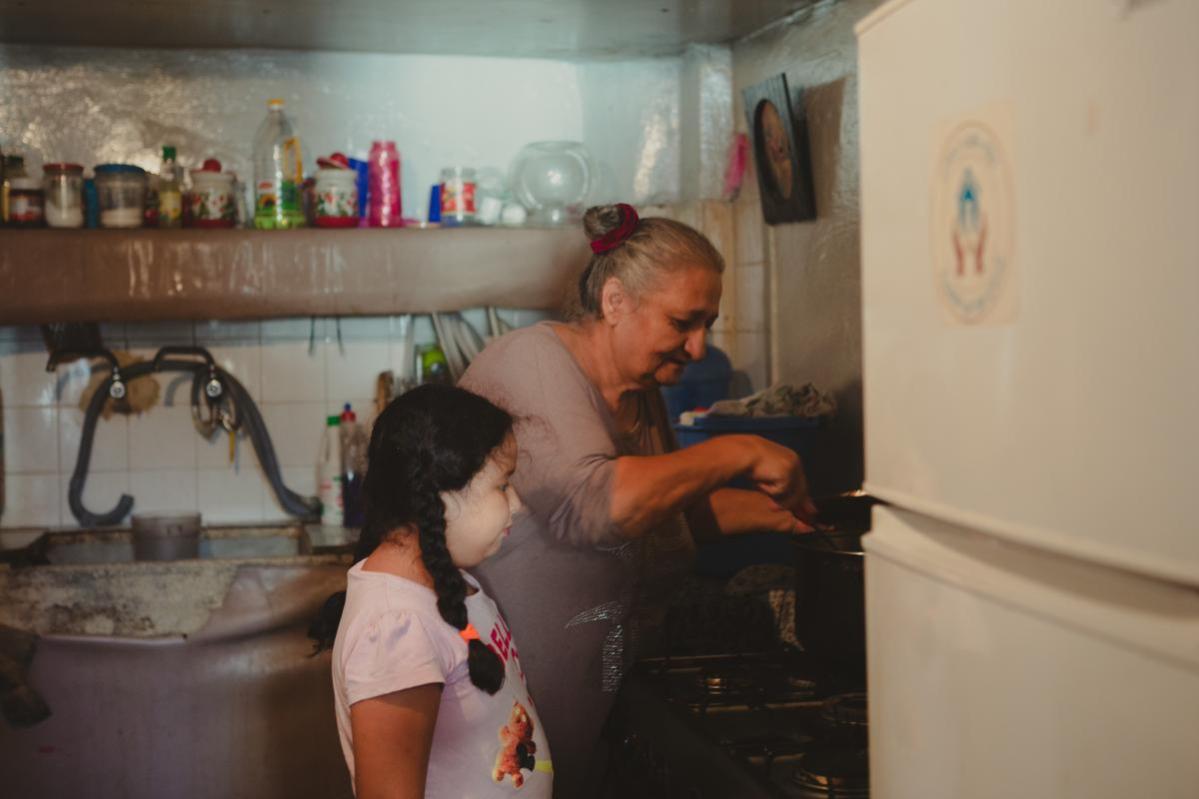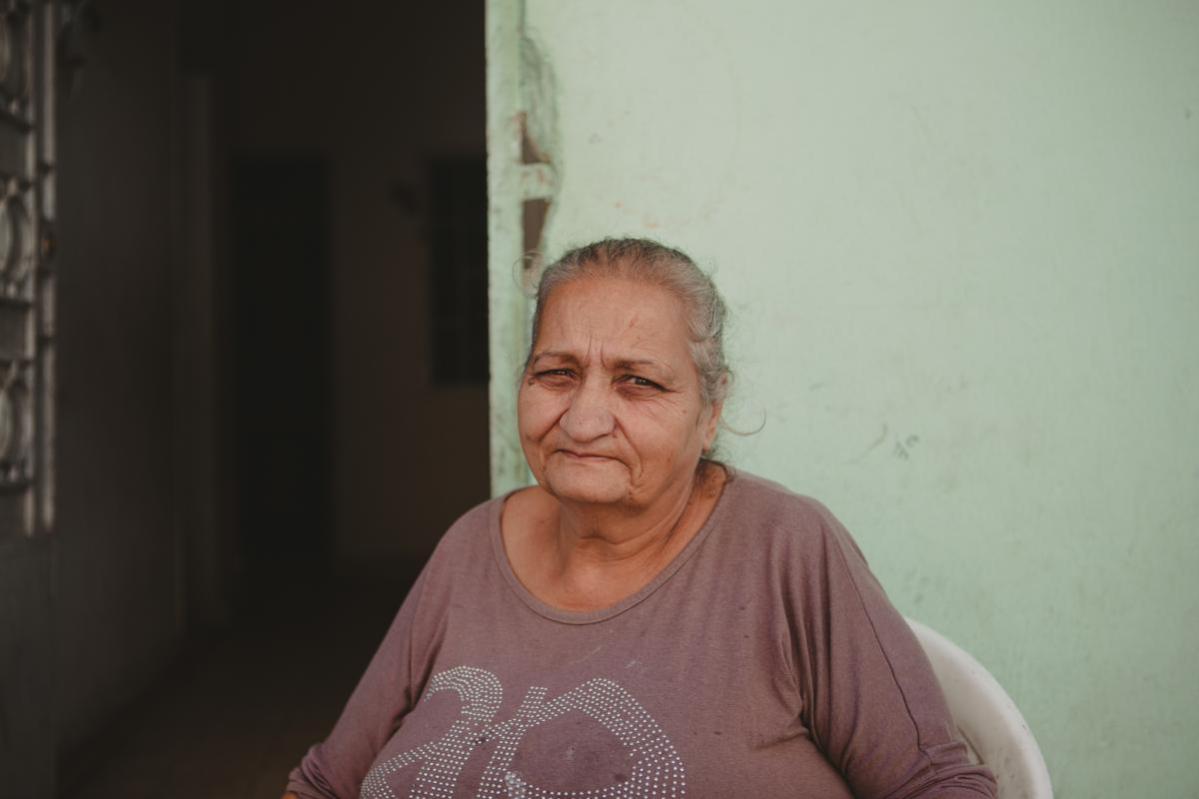Accessing adequate food has become a real challenge in Lebanon
The multiple crises continue hiking food prices, and more families are forced to skip meals since they are unable to afford products that are essential for a healthy diet, causing them, and especially children, to endure malnutrition.
Beirut, Lebanon – Zahra*, a young Syrian refugee living in Bourj Hammoud—one of the poorest neighbourhoods of the Lebanese capital city—welcomes us in the minuscule apartment in which she lives with her husband and their baby girl. It is very dark inside despite it is a sunny morning. There are no windows or any ventilation system and, as it is usual now in Lebanon, neither is there electricity. However, they at least live inside a building—almost 60 percent of more than 1.5 million of Syrians in Lebanon live in dangerous, substandard or overcrowded settlements according to the UN, but the family’s living conditions are still very adverse. A couple of sofas with a small table, a wardrobe, an old fridge and two mattresses on the floor are their only belongings.
“Before the explosion, the situation was much better. Before, my husband used to work in a slaughterhouse in front of the Beirut port, but the explosion destroyed it and his boss died. Before, we were able to buy food, diapers and other products for my daughter… We can barely buy food now”, the 29-year-old woman complains.
The economic and financial meltdown exacerbated by the Covid-19 pandemic and the 4th of August 2020 Beirut explosion caused a nation that was considered one of the Middle Eastern’s most developed countries to collapse and lives now one of its worst moments.
Official data from the Lebanese government indicates an increase in food prices of 1,874 percent from December 2019 to October 20212; subsidies have recently been uplifted and shortages in essential services are very common. These difficulties have pushed the vast majority of Syrian refugees to the brink of starvation as nine out of ten Syrian refugee families are now living in extreme poverty according to the UN. Medicines are also almost impossible to get due to the same reasons.
“I only have one kidney due to a birth defect. I cannot find my treatment for 2 months. One of my relatives had to travel to another city to buy it due to the shortage of medicines— Zahra explains. My only child also suffers a birth defect in her heart’s muscles. We cannot go to the hospital because it is too expensive. It has been 2 months since my daughter doesn’t go to the doctor.”
Almost three-quarters of the population living in poverty
Zahra fled Syria leaving everything behind when she lost her parents after a bomb attack in her hometown.
“I came alone to Lebanon, and I suffered too much because I didn’t know anyone here. I couldn’t come back because I have nobody there now, and the situation in Syria is very hard. I had to live in the streets until I met my husband, then we got married and my baby girl was born’, —she cannot hold her tears. “I wish we could move to a country in which they can take care of us.”
The difficulties that the exhausted Syrian refugee community is facing after more than 10 years of asylum is nothing else but dreadful. The last UN study says that most of the Syrians are forced to borrow money, beg, reduce health expenses, not pay rent or not send their children to school. They are especially vulnerable considering restrictions for refugees in access to employment, thus increasing the risk of child labour and hindering children’s education.
Not only is the refugee community the one suffering the dire consequences of the predicament, but also the entire society living in Lebanon. Almost three-quarters of the population residing in the country are unable to reach the minimum living standard, warned the UN Economic and Social Commission for Western Asia (ESCWA) in September 20215, and the data collected in 2021 by the Multi-Sector Needs Assessment says that 1.3 million Lebanese citizens suffer from food insecurity.
The worsening of the socio-economic situation, unceasing power cuts, in addition to the uplifting of subsidies, shortages and skyrocketing in prices of most services, especially fuel, make safe nutritious food unavailable and inaccessible for many people.
What is more, even getting safe water has become challenging due to the bottled water’s deorbited price that forced families to turn to tap water—which contains prominent levels of contamination—for domestic use.

Olivia and her granddaughter in her house in Bourj Hammoud, Beirut. They can barely afford to buy food and cover their basic needs. Action Against Hunger offer them cash support thanks to the France Embassy funds. Author: Carmen Moreno/Action Against Hunger.
“I have no money to buy bottles for the kids. We can only afford bottled water for the 1-year-old baby girl. The rest of us drink water from the tap that is dirty, and we get stomach infections”, Olivia says.
Olivia is an Armenian-Lebanese 65-year-old widow who also lives in a modest house in Bourj Hammoud taking care of her six grandchildren. Her son is currently missing, and the mother of two of her grandkids—a Filipino woman—was deported some years ago to her home country, so they also lost contact with her. Their two daughters—who live with their grandmother now—have no ID and cannot be enrolled in school or go to the hospital.
“My husband died from a disease that eats the bones, and his leg was cut eight times—the widow remembers. The doctor said it is something genetic and most probably one of my children will get it. My granddaughter’s father has the disease and so does one of his daughters. My son needed 26 injections to relieve the symptoms and the doctor put him in the hospital, but he had to start working as a valet worker to be able to stay because it was awfully expensive. After two years he disappeared, and I don’t know anything about him.”
Olivia’s daughter and her four children also live with her, and she is the family’s main source of income, although her salary is not enough to cover their basic needs, so they have often to rely upon their neighbours looking for support. The detriment of the living conditions and the loss of more than 92 percent of the value of the Lebanese lira between February 2021 and February 2022 has left around 60% of families limiting portion size and 41% reducing the number of meals.
“My daughter Ana is divorced. She has four children—two boys and two girls—and takes care of the two orphan girls. She was injured due to Beirut Blast, so she stopped working for a while till she got cured. Moreover, she cannot work anywhere because she studied till grade 9 so she is working as a cleaner and takes care of elderly people now. Ana is 30 years old, and she is taking care of six kids. She is working and helping me as much as she can. I work also, I do crochet, but I don’t earn much,” Olivia worries.
“I feel like it is a dream that someone stands by me”
Most vulnerable homes continue daily striving to keep access to food, water, shelter, medical care, and education with unprecedent difficulties. Action Against Hunger supports as many people as possible living in unacceptable conditions like Zahra and Olivia through monthly Multi-purpose Cash Assistance (MPCA) focused on addressing their most urgent needs according to each situation. Provided that it is not a response limited to the distribution of a particular aid material—like food parcels or food vouchers that work with certain selected suppliers, the MPCA allows the right holders to select the products that they want to buy as well as use it to pay services and other non-food expenses. Thanks to the assistance, Zahra managed to buy some furniture for her flat.
“The cash assistance helps me in many ways. Firstly, I started to fill the fridge with food., I also bought a wardrobe to put my clothes in it—my stuff was in boxes before. I bought sofas—we were sitting on the floor before. When I first received the money, I was so happy that I started crying because before I had no food in the fridge, no diapers for my baby, not even bread… I had always to ask my neighbours for support”.

Olivia is a very vulnerable lebanese woman who is living under precarious conditions in Bourj Hammoud, Beirut. She can barely afford to mantain herself and her family, so Action Against Hunger offers her cash support thanks to the France Embassy funds. Author: Carmen Moreno / Action Against Hunger.
Olivia is receiving the MPCA as well and affirms that, without it, she would not be able to buy nutritious food products to feed their six grandkids.
“Every 27th or 28th of each month, my granddaughters ask me about the assistance because they know when we receive them, so they are waiting impatient because as soon as we receive it, I go and buy chicken and meat, and this is the only time of the month when we can eat something special”, she confesses.
The last survey launched by the Lebanon Nutrition Sector led by UNICEF and Action Against Hunger unfolded that around 200,000 children under the age of five suffer from a form of malnutrition, including anaemia, stunting, and wasting, which will generate life-long and even generational tragic consequences. It warns that these numbers may rise unless prompt action is taken. The report also shows that, compared to 2012, there is a deteriorating trend in stunting, women’s anaemia, and non-exclusive breastfeeding practices in the case of Syrian refugees.
Even though the financial assistance has proved successful to enable access to adequate diet diversity and nutrient-rich food, this is a short-term solution that is not sustainable. An accelerated multisystem preventive response is needed, and it may particularly increase infant and young children’s chance of survival. There is no denying that we—and the humanitarian response in general—continue expanding our efforts, but the needs remain worryingly high and the crisis in the country is gradual and incessant. Thousands of families that once never had to worry about putting food on the table have suddenly plunged into complete poverty.
“All I want is my kids to be happy and eat well,” Olivia concludes.
* Aliases are used for the interviewees instead of their real names to protect their identities.
